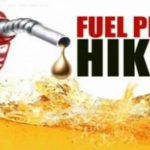With the addition of the carbon tax, and another hike in the general fuel and Road Accident fund levies, motorists will soon be paying a big chunk of their total petrol bill to government.
In his budget speech on Wednesday (20 February), finance minister Tito Mboweni said that the general fuel levy will be increased by 15 cents a litre for petrol and diesel from 3 April.
The Road Accident Fund (RAF) levy will also increase by 5 cents a litre for petrol and diesel on the same date.
As expected, the introduction of South Africa’s Carbon Tax will see an additional 9 cents per litre on petrol and 10 cents per litre on diesel added – however, this change will come into effect from 5 June.
While the increases are largely in line with expectations leading up to the budget speech, further increases in the fuel levy will likely have inflationary effects and increase transportation costs.
According to the AA, while the increases to the general fuel and Road Accident Fund levies are lower than expected, it is still concerning that these levies are seen as the ‘go-to’ taxes for easy increases by government.
“Now, with the addition of the Carbon Tax on fuel, this ‘easy’ tax collection method is being further exploited, thus adding another line of tax to the fuel price,” the group said.
Consumers currently pay R5.34 towards indirect taxes on every litre of petrol bought, and R5.19 on every litre of diesel.
This comprises R3.37 (petrol) and R3.22 (diesel) for the general fuel levy, R1.93 for the RAF levy (for petrol and diesel) and 4 cents for customs and excise taxes (for both petrol and diesel).
With the increases announced in the Budget Speech today, these levies will now increase by a combined 29 cents for petrol and 30 cents for diesel – including the carbon tax.
By the end of the hikes, SA motorists will be paying R5.63 and R5.49 in taxes per litre for petrol and diesel, respectively.
On a vehicle with a 50 litre tank, this means that drivers will be paying between R274.50 (diesel) and R281.50 (petrol) in tax, every time they fill up (with a full tank).
This represents a significant hike in the proportion of taxes motorists pay in every litre of petrol.
Below, we have broken down how taxes as a portion of the pump price has changed over the last 15 years or so.
With the addition of the carbon tax, taxes now make up the highest proportion of fuel prices ever.
The figures above are based on February petrol prices, and will change based on any increases or decreases in the fuel price over the next few months. Should the petrol price increase, the portion of taxes relative to the pump price will drop accordingly.
Should the petrol price decrease, the proportion of taxes will go up.
According to the latest petrol price data from the Central Energy Fund, motorists are heading for a sharp petrol price hike in March 2019, with the group showing an under-recovery of around 57 cents per litre for petrol, and a hefty 75 cents per litre for diesel.










